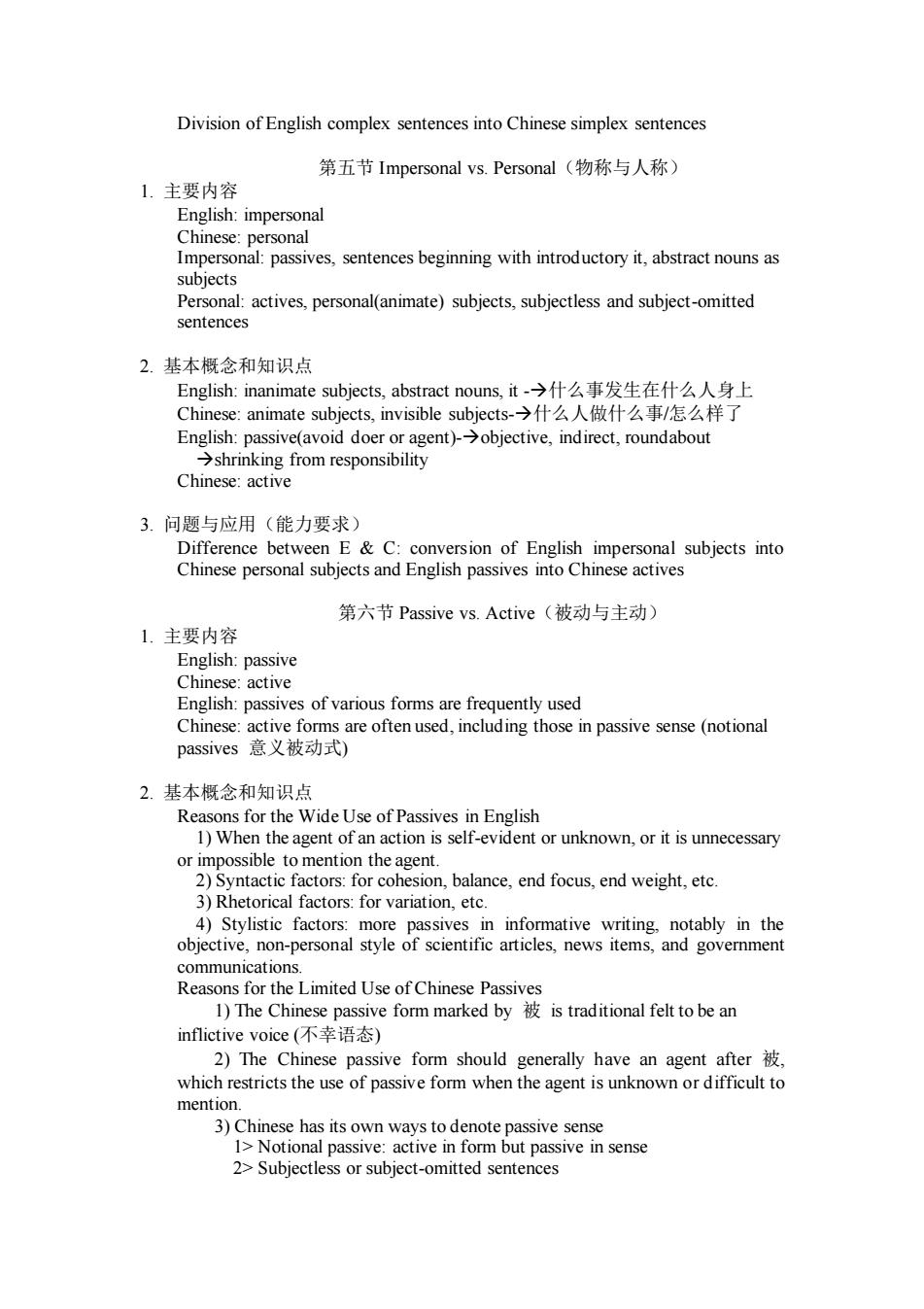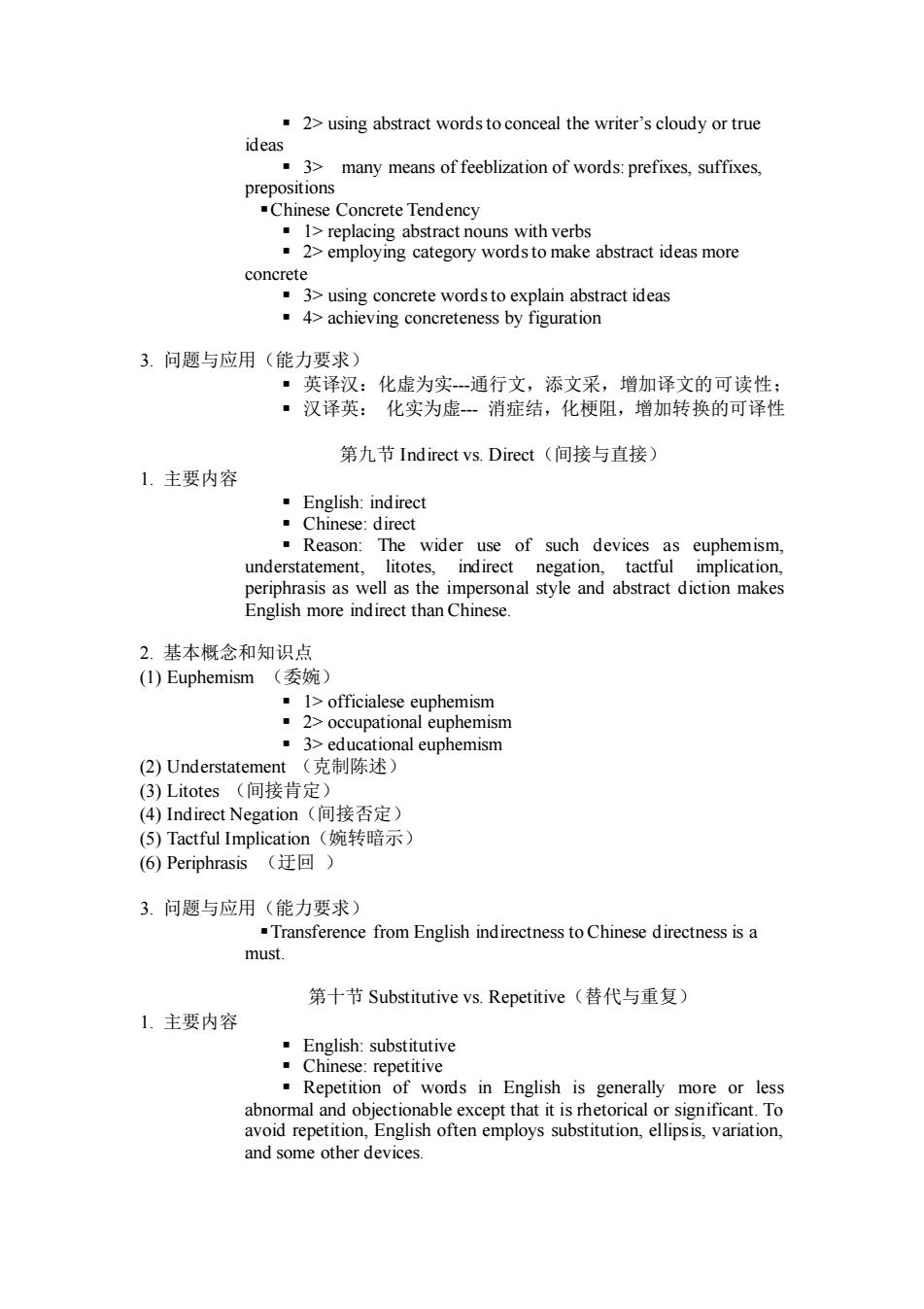
Division of English complex sentences into Chinese simplex sentences 第五节Impersonal vs..Personal(物称与人称) 1.主要内容 English:impersonal Chinese: rsonal:pas sives.sentences beginning with introductory it abstract nouns as subiects Personal:actives,personal(animate)subjects,subjectless and subject-omitted sentences 2.基本概念和知识点 English:inanimate subjects,.abstract nouns,it-→什么事发生在什么人身上 Chinese:animate subje cts,invisible subjects--→什么人做什么事/怎么样了 English pas oid doe gent)→objective,. roundabout Chinese:active from responsibility 3.问题与应用(能力要求) Difference betw E&C rsion of English in onal subjects into Chinese personal subiects and English passives toChin se actives 第六节Passive vs..Active(被动与主动) 1.主要内容 :passi English ently used Chinese: ctive fo are often used,including those in passive sense (notional passives意义被动式) 2.基本概念和知识点 the Wide Use of Pa e age t of or synt ors:the 3Rhetorical factors:for variation on,balance,end focus,end weight,etc. etc 4)Stylistic factors:more passives in informative writing.notably in the objective,non-personal style of scientific articles,news items,and government communications Reasons for the Limited Use of Chinese Passives 1)The Chinese passive form marked by is traditional felt to be an inflictive voice(不幸语态) sive form should generally have an agent after ets the o pave om when theor t 3)Chir n w ys to d I>Not onal in fo 2>Subiectless or subjec -omitted sentences
Division of English complex sentences into Chinese simplex sentences 第五节 Impersonal vs. Personal(物称与人称) 1. 主要内容 English: impersonal Chinese: personal Impersonal: passives, sentences beginning with introductory it, abstract nouns as subjects Personal: actives, personal(animate) subjects, subjectless and subject-omitted sentences 2. 基本概念和知识点 English: inanimate subjects, abstract nouns, it -→什么事发生在什么人身上 Chinese: animate subjects, invisible subjects-→什么人做什么事/怎么样了 English: passive(avoid doer or agent)-→objective, indirect, roundabout →shrinking from responsibility Chinese: active 3. 问题与应用(能力要求) Difference between E & C: conversion of English impersonal subjects into Chinese personal subjects and English passives into Chinese actives 第六节 Passive vs. Active(被动与主动) 1. 主要内容 English: passive Chinese: active English: passives of various forms are frequently used Chinese: active forms are often used, including those in passive sense (notional passives 意义被动式) 2. 基本概念和知识点 Reasons for the Wide Use of Passives in English 1) When the agent of an action is self-evident or unknown, or it is unnecessary or impossible to mention the agent. 2) Syntactic factors: for cohesion, balance, end focus, end weight, etc. 3) Rhetorical factors: for variation, etc. 4) Stylistic factors: more passives in informative writing, notably in the objective, non-personal style of scientific articles, news items, and government communications. Reasons for the Limited Use of Chinese Passives 1) The Chinese passive form marked by 被 is traditional felt to be an inflictive voice (不幸语态) 2) The Chinese passive form should generally have an agent after 被, which restricts the use of passive form when the agent is unknown or difficult to mention. 3) Chinese has its own ways to denote passive sense 1> Notional passive: active in form but passive in sense 2> Subjectless or subject-omitted sentences

3>Using generic person as subjects 4>Using executive form(处置式) 3.问题与应用(能力要求) Transference from the English passive to Chinese active 第七节Static ys.Dynamic(静态与动态】 1.主要内容 ·English:fe ed by its predominance of nouns over verbs. nouns:ref vebs:ndicaecin activity,temporary or changing conditions 2.基本概念和知识点 English static Tendency 1>using agentive noun instead of verbs .2>using headline phrase instead ofadjectives 3>predominance of nouns leading to wide use of prepositions 4>feeblization of verbs 5>using adjectives or adverbs instead of verbs .Chinese Dynamic Tendency ·1>动词连用 ·2>动词(词组)充当汉语句子的各种成分 ·3>汉语动词常常重复或重叠 3.问颗与应用(能力要求】 ■Owin to the difference a e,th conversion of the English the CH ctives into prep ositions into verbs. nouns into tc 第八节Abstract vs..Concrete(抽象与具体) 1.主要内容 ·English:abstrac nalization often results in abstraction.An exc at th se of the v will.in the end.detach the ter from ealiti of he and the from when and how and in what mood the thing was done.and insensibly induce a habit of abstraction,generalization and vagueness "Chinese:prefers to use concrete or specific words and employs a"down-to-earth"style,often making abstract ideas plain by metaphors, similes,allegories,or other devices. 2.基本概念和知识点 "English Abstract Tendency 1>regarding abstract thinking a superior mind,a mark of civilized man
3>Using generic person as subjects 4>Using executive form (处置式) 3. 问题与应用(能力要求) Transference from the English passive to Chinese active 第七节 Static vs. Dynamic(静态与动态) 1. 主要内容 ▪ English: static ▪ Chinese: dynamic ▪ English: featured by its predominance of nouns over verbs; nouns: refer to entities that are stable ▪ Chinese: more verbs used than nouns; verbs: indicate action, activity, temporary or changing conditions 2. 基本概念和知识点 ▪English Static Tendency ▪ 1> using agentive noun instead of verbs ▪ 2> using headline phrase instead of adjectives ▪ 3> predominance of nouns leading to wide use of prepositions ▪ 4> feeblization of verbs ▪ 5> using adjectives or adverbs instead of verbs ▪Chinese Dynamic Tendency ▪ 1> 动词连用 ▪ 2> 动词(词组)充当汉语句子的各种成分 ▪ 3> 汉语动词常常重复或重叠 3. 问题与应用(能力要求) ▪ Owing to the difference above, the conversion of the English nominal style into the Chinese verbal style is necessary: nouns into verbs, adjectives into adverbs, prepositions into verbs, etc. 第八节 Abstract vs. Concrete(抽象与具体) 1. 主要内容 ▪ English: abstract ▪ Chinese: concrete ▪ English: Nominalization often results in abstraction. An excessive reliance on the noun at the expense of the verb will, in the end, detach the mind of the writer from the realities of here and there, from when and how and in what mood the thing was done, and insensibly induce a habit of abstraction, generalization and vagueness. ▪ Chinese: prefers to use concrete or specific words and employs a “down-to-earth” style, often making abstract ideas plain by metaphors, similes, allegories, or other devices. 2. 基本概念和知识点 ▪English Abstract Tendency ▪ 1> regarding abstract thinking a superior mind, a mark of civilized man

"2>using abstract words to conceal the writer's cloudy or true ideas 3>many means of feeblization of words:prefixes,suffixes, prepositions .Chinese Concrete Tendency 25pc盟ecaremgoNodbetetsaliesae concrete using concrete words to explain abstract ideas 4>achieving concreteness by figuration 3.问题与应用(能力要求) ·英译汉:化虚为实通行文,添文采,增加译文的可读性 ·汉译英:化实为虚一消症结,化梗阻,增加转换的可译性 第九节Indirect vs.Direct(间接与直接) 1.主要内容 ■English:indirect ■Chinese'direct Reason:The wider use of such devices as euphemism understatement,litotes,indirect negation,tactful implication, periphrasis as well as the impersonal style and abstract diction makes English more indirect than Chinese. 2.基本概念和知识点 (I)Euphemism(委婉) 1>officialese euphemism 2>occupational euphemism 3>educational euphemism (2)Understatement(克制陈述) (3)Litotes(间接肯定) (4)Indi ct negation(间接否定) (5)Tactful Implica 婉转暗示 (6)Periphrasis(过回) 3.问题与应用(能力要求) .Transference from English indirectness to Chinese directness is a must. 第十节Substitutive vs.Repetitive(替代与重复) 1.主要内容 "English:substitutive ·Chinese:repetitive .Repetition of words in English is generally more or less abnormal and objectionable except that it is rhetorical or significant.To avoid repetition,English often employs substitution,ellipsis,variation, and some other devices
▪ 2> using abstract words to conceal the writer’s cloudy or true ideas ▪ 3> many means of feeblization of words: prefixes, suffixes, prepositions ▪Chinese Concrete Tendency ▪ 1> replacing abstract nouns with verbs ▪ 2> employing category words to make abstract ideas more concrete ▪ 3> using concrete words to explain abstract ideas ▪ 4> achieving concreteness by figuration 3. 问题与应用(能力要求) ▪ 英译汉:化虚为实---通行文,添文采,增加译文的可读性; ▪ 汉译英: 化实为虚--- 消症结,化梗阻,增加转换的可译性 第九节 Indirect vs. Direct(间接与直接) 1. 主要内容 ▪ English: indirect ▪ Chinese: direct ▪ Reason: The wider use of such devices as euphemism, understatement, litotes, indirect negation, tactful implication, periphrasis as well as the impersonal style and abstract diction makes English more indirect than Chinese. 2. 基本概念和知识点 (1) Euphemism (委婉) ▪ 1> officialese euphemism ▪ 2> occupational euphemism ▪ 3> educational euphemism (2) Understatement (克制陈述) (3) Litotes (间接肯定) (4) Indirect Negation(间接否定) (5) Tactful Implication(婉转暗示) (6) Periphrasis (迂回 ) 3. 问题与应用(能力要求) ▪Transference from English indirectness to Chinese directness is a must. 第十节 Substitutive vs. Repetitive(替代与重复) 1. 主要内容 ▪ English: substitutive ▪ Chinese: repetitive ▪ Repetition of words in English is generally more or less abnormal and objectionable except that it is rhetorical or significant. To avoid repetition, English often employs substitution, ellipsis, variation, and some other devices